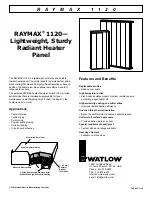
14
Enerco | enerRadiant® HST Series Heater
Operating Instructions and Owner’s Manual
MINIMUM HEIGHT FROM ROOF
TO LOWEST DISCHARGE OPENING
Roof Pitch
H (Min)
Flat to 6/12
1.0 Feet
Over 6/12 to 8/12
1.5 Feet
Over 8/12 to 10/12
2.5 Feet
Over 10/12 to 12/12
4.0 Feet
Over 12/12 to 16/12
6.0 Feet
Over 16/12 to 20/12
7.5 Feet
2. All other gas vents shall terminate not less than 2 feet (0.6m)
above the highest point where they pass through the roof and
at least 2 feet (0.6m) higher than any portion of a building
located within 10 feet (3.1m) as shown in the following
illustration.
Venting/Ducting
For Commercial and Industrial Installations Only
General Requirements
Use aluminum or teflon tape suitable for 550°F (3M Company
tapes #433 or #363) or RTV silicone sealant.
Heater must be vented in accordance with specification ANSI
Z223.1 - latest revision
. Partial information relating to this
specification is provided in this section with regard to size and
configurations for venting arrangements. For complete information
consult
ANSI Z223.1 - latest revision
and applicable local codes.
Use the following guidelines to help insure an adequate, safe
ventin arrangement.
Vent Pipe
(Single Wall)
Seal joint &
annular space.
2" Clearance
Boot Flashing
Storm Collar
Vent Pipe
Type B
(Double Wall)
Vent Cap
Type B
10ft. or less
2ft. min.
c) Horizontal Through the Sidewall
This heater, when horizontally vented, must be installed with
the approved venting system.
When venting the heater horizontally through a combustible
outside wall, the same requirements listed previously for Venting
Through the Roof
apply except as follows:
1. When venting the heater to the outside of the building through
a sidewall, use 3 inch O.D. single-wall metal pipe. This is to be
constructed of galvanized sheet metal or other approved
noncombustible, corrosion-resistant material as indicated by
state and/or local codes.
2. For horizontal venting, the vent lengths may be as follows:
Minimum Equivalent Length = 5 feet of Pipe
Maximum Equivalent Length = 25 feet of Pipe
Use the following correction factors to obtain the equivalent
length:
a) Subtract 15 feet if the run is horizontal
b) Subtract 10 feet for an approved vent cap.
c) Subtract 10 feet for each elbow beyond 15 feet from the
heater.
d) Subtract 15 feet for each elbow within 15 feet of the heater.
NOTE
: To minimize problems associated with
condensation in long runs, vent pipe can be
insulated.
3. The horizontal venting system approved with this heater consists
of the Side Wall Vent Kit (02840) shown are page 3.
4. Limit the quantity of 90° elbows to two. When vent pipe is in a
horizontal run, it must be pitched downward ¼ inch per foot
towards the vent terminal. The heater must be installed level.
5. The horizontal venting system shall not terminate:
a) Less than 4 feet (1.2m) below, 4 feet (1.2m) horizontally from,
or 1 foot (30cm) above any door, window or gravity air inlet into
any building. The bottom of the vent terminal shall be located at
least 7 feet (2.1m) above grade or above snow accumulation
levels as determined by local codes.
b) Less than 3 feet (0.9m) from a combustion air inlet.
c) Less than 3 feet (0.9m) from any other building opening or
any gas service regulator.
d) Directly over areas where condensate or vapor could create a
nuisance or hazard or be harmful to the operation of gas utility
meters, regulators, relief valves, or other equipment. Building
materials should be protected from flue gases and condensate.
6. In regions of the country where prevailing winds are consistently
higher than 40 mph, it may be necessary to terminate the vent
system above the roof level.
Single-Wall
Vent Pipe
Wall Thimble
Wall
18"
Vent Cap
Type “B” Vent










































